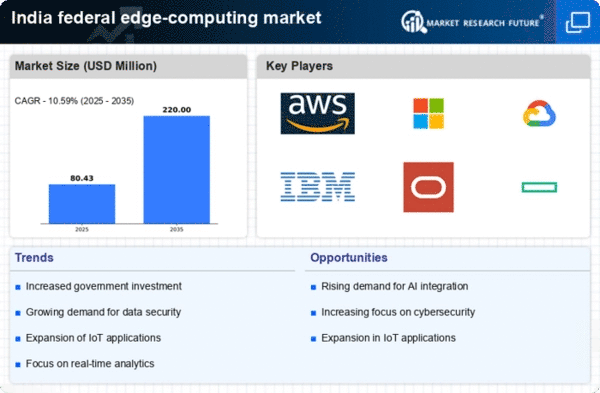Emergence of Smart Government Initiatives
The emergence of smart government initiatives is a key driver for the federal edge-computing market. As India aims to enhance public services through digital transformation, edge computing plays a vital role in enabling smart solutions. These initiatives often involve the integration of IoT devices, data analytics, and real-time processing capabilities, all of which are facilitated by edge computing. The federal edge-computing market is likely to expand as agencies implement smart solutions that improve service delivery, enhance citizen engagement, and optimize resource management. The government's commitment to digital governance is reflected in various projects aimed at creating smart cities and improving public infrastructure. As these initiatives gain momentum, the demand for edge computing solutions is expected to rise, further propelling the market forward.
Enhanced Network Connectivity Initiatives
The push for enhanced network connectivity across India serves as a significant driver for the federal edge-computing market. With the government's initiatives to improve digital infrastructure, including the rollout of 5G technology, the potential for edge computing applications increases. Enhanced connectivity allows for more devices to be connected and managed efficiently, which is vital for applications in smart cities and remote monitoring. The federal edge-computing market stands to benefit from these advancements, as they enable faster data transmission and lower latency. As a result, agencies can deploy edge computing solutions that support critical applications, thereby improving service delivery and operational efficiency. The anticipated increase in connected devices is expected to drive the market further, with estimates suggesting that the number of IoT devices in India could reach 1 billion by 2025.
Increased Focus on Cybersecurity Measures
The rising threat of cyberattacks has led to an increased focus on cybersecurity measures within the federal edge-computing market. As government agencies in India adopt edge computing technologies, they must also address the associated security challenges. The decentralized nature of edge computing can expose systems to vulnerabilities, making robust cybersecurity protocols essential. Consequently, agencies are investing in advanced security solutions that protect data at the edge, ensuring that sensitive information remains secure. This heightened focus on cybersecurity is likely to drive the federal edge-computing market, as agencies seek to implement comprehensive security frameworks that safeguard their operations. Reports suggest that the cybersecurity market in India is expected to grow by over 20% annually, indicating a strong correlation between cybersecurity investments and the adoption of edge computing technologies.
Regulatory Compliance and Data Sovereignty
Regulatory compliance and data sovereignty are increasingly influencing the federal edge-computing market. As data protection laws become more stringent, government agencies are compelled to adopt edge computing solutions that ensure compliance with local regulations. This trend is particularly relevant in sectors such as healthcare and finance, where sensitive data must be handled with utmost care. The federal edge-computing market is likely to see growth as agencies prioritize solutions that facilitate data localization and secure processing. Furthermore, the emphasis on data sovereignty aligns with national security interests, prompting investments in edge computing technologies that can operate within the country's legal framework. This focus on compliance not only mitigates risks but also enhances public trust in government services, thereby driving further adoption of edge computing solutions.
Growing Demand for Real-Time Data Processing
The increasing need for real-time data processing is a pivotal driver in the federal edge-computing market. As government agencies in India seek to enhance operational efficiency, the ability to process data at the edge becomes crucial. This demand is particularly evident in sectors such as defense and public safety, where timely decision-making can significantly impact outcomes. Reports indicate that the market for edge computing solutions is projected to grow at a CAGR of approximately 30% over the next five years. This growth is likely fueled by the necessity for immediate data analysis and response capabilities, which are essential for effective governance and service delivery. Consequently, the federal edge-computing market is positioned to expand as agencies invest in technologies that facilitate real-time data processing.
















